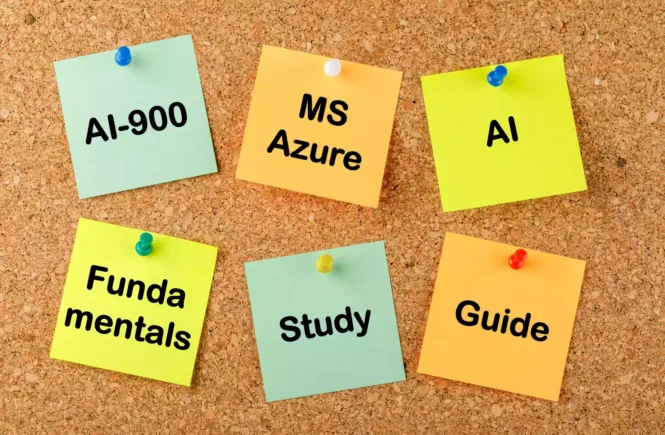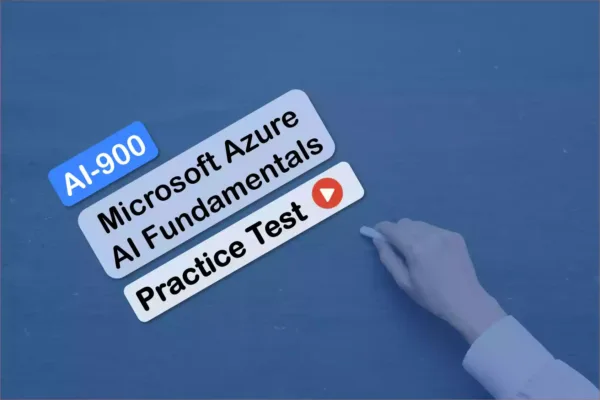AI-900 Preparation Details
Preparing for the AI-900 Microsoft Azure AI Fundamentals Certificate exam? Don’t know where to start? This post is the AI-900 Certificate Study Guide (with links to each exam objective).
I have curated a list of articles from Microsoft documentation for each objective of the AI-900 exam. I hope this article will help you to prepare for the AI-900 Certification exam. Also, please share the post within your circles so it helps them to prepare for the exam.
AI-900 Azure AI Fundamentals Online Course
| LinkedIn Learning (Free trial) | Exam Tips: Microsoft Azure AI Fundamentals |
| Udemy | Microsoft Azure AI Fundamentals Preparation |
| Pluralsight | Artificial Intelligence: Executive Briefing |
| Coursera | AI Fundamentals Exam Prep Specialization |
AI-900 Azure AI Fundamentals Practice Test
| Whizlabs Exam Questions | Microsoft Azure Fundamental Practice Test |
| Udemy Practice Tests | AI Fundamentals Certificate Exam |
AI-900 Azure AI Fundamentals Other Stuff
| Udacity (Nanodegree) | Artificial Intelligence Nanodegree Program |
| Amazon e-book (PDF) | Microsoft Azure AI Fundamentals |
AI-900 Sample Practice Exam Questions
Looking for AI-900 Dumps? Read This!
Using ai-900 exam dumps can get you permanently banned from taking any future Microsoft certificate exam. Read the FAQ page for more information. However, I strongly suggest you validate your understanding with practice questions.
Check out all the other Azure certificate study guides
Full Disclosure: Some of the links in this post are affiliate links. I receive a commission when you purchase through them.
Describe Artificial Intelligence Workloads and Considerations (15-20%)
Identify Features of Common AI Workloads
Identify prediction/forecasting workloads
Demand forecasting & price optimization
Demand forecasting for shipping and distribution
Identify features of anomaly detection workloads
Identify computer vision workloads
Applying content tags to images
Detect common objects in images
Detect popular brands in images
Categorize images by subject matter
Describe images with a human-readable language
Identify natural language processing or knowledge mining workloads
Choosing a natural language processing technology in Azure
Identify conversational AI workloads
Conversational AI tools: To build, connect & manage intelligent bots
Identify Guiding Principles for Responsible AI
Describe considerations for fairness in an AI solution
Describe considerations for reliability and safety in an AI solution
Describe considerations for privacy and security in an AI solution
Describe considerations for inclusiveness in an AI solution
Describe considerations for transparency in an AI solution
Describe considerations for accountability in an AI solution
FATE: Fairness, Accountability, Transparency & Ethics in AI
Amazon link (affiliate)
Describe Fundamental Principles of Machine Learning on Azure (30-35%)
Identify Common Machine Learning Types
Identify regression machine learning scenarios
Identify classification machine learning scenarios
Identify clustering machine learning scenarios
Describe Core Machine Learning Concepts
Identify features and labels in a dataset for machine learning
Describe how training and validation datasets are used in machine learning
About train, validation & test sets in Machine learning
Describe how machine learning algorithms are used for model training
Which machine learning algorithm should I use?
Select and interpret model evaluation metrics for classification and regression
Metrics for Classification models
Identify Core Tasks in Creating a Machine Learning Solution
Describe common features of data ingestion and preparation
Data Preparation for Machine Learning
Describe feature engineering and selection
Beginner’s guide to feature selection in Python
Representation: Feature Engineering
Describe common features of model training and evaluation
Introduction to Machine learning model evaluation
Describe common features of model deployment and management
Deploy real-time machine learning services with Azure Machine Learning
Machine Learning Operations (MLOps)
Describe Capabilities of No-Code Machine Learning with Azure Machine Learning Studio
Automated ML Wizard UI
What is automated machine learning (AutoML)?
Azure Machine Learning designer
What is an Azure Machine Learning designer?
Describe Features of Computer Vision Workloads on Azure (15-20%)
Identify Common Types of Computer Vision Solution
Identify features of image classification solutions
Train image classification models with MNIST data & sci-kit-learn
Identify features of object detection solutions
Detect common objects in images
Identify features of optical character recognition solutions
Optical Character Recognition (OCR)
Identify features of facial detection, recognition, and analysis solutions
How to analyze videos in real-time?
Identify Azure Tools and Services for Computer Vision Tasks
Identify capabilities of the Computer Vision service
Identify the capabilities of the Custom Vision service
Identify capabilities of the Face service
What is the Azure Face service?
Identify capabilities of the Form Recognizer service
Describe Features of Natural Language Processing (NLP) Workloads on Azure (15-20%)
Identify Features of Common NLP Workload Scenarios
Identify features and uses for keyphrase extraction
How to extract key phrases using Text Analytics?
Identify features and uses for entity recognition
Entity recognition cognitive skill
Identify features and uses for sentiment analysis
Sentiment analysis with cognitive service & Azure
Identify features and uses for language modeling
MSRLM: A scalable language modeling toolkit
Identify features and uses for speech recognition and synthesis
Get started with speech-to-text
Identify features and uses for translation
Identify Azure Tools and Services for NLP Workloads
Identify the capabilities of the Text Analytics service
What is the Text Analytics API?
Identify the capabilities of the Language Understanding Service (LUIS)
What is Language Understanding (LUIS)?
Identify the capabilities of the Speech service
Identify capabilities of the Text Translator service
Translator: Value of Translator
Describe Features of Conversational AI Workloads on Azure (15-20%)
Identify Common Use Cases for Conversational AI
Identify features and uses for webchat bots
Identify common characteristics of conversational AI solutions
Microsoft Conversational AI tools
Identify Azure Services for Conversational AI
Identify capabilities of the QnA Maker service
Identify capabilities of the Azure Bot Service
This brings us to the end of the AI-900 Azure AI Fundamentals Study Guide.
What do you think? Let me know in the comments section if I have missed out on anything. Also, I love to hear from you about how your preparation is going on!
In case you are preparing for other Azure certification exams, check out the Azure study guide for those exams.
Follow Me to Receive Updates on AI-900 Exam
Want to be notified as soon as I post? Subscribe to the RSS feed / leave your email address in the subscribe section. Share the article to your social networks with the below links so it can benefit others.








10 Comments
Could this link be more appropriate to “Identify features and uses for webchat bots” ?
https://docs.microsoft.com/en-us/azure/bot-service/bot-builder-webchat-overview?view=azure-bot-service-4.0
Thank you. Updated accordingly
Very useful. Thank you.
Keep up the good work. You have been very helpful.
Thank you
Hi,
I am preparing for AI-900 MICROSOFT AZURE AI FUNDAMENTALS.
I cannot find any related article anywhere else.
Could you please share some practice questions for the same.
Other than the official content I cannot find anything else to refer to for this exam.
Hello Hussain,
I do not have any practice tests for ai-900. I hope something will be available in Udemy in a month or so
Hi,
Really liking your site!
Hope you are finding it useful.